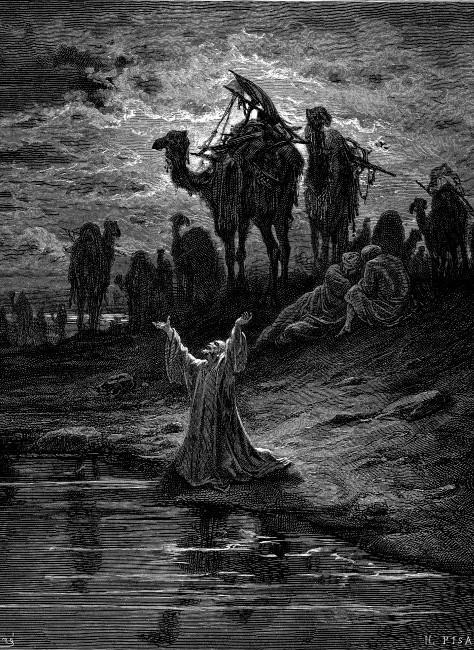The Jacob narrative is bookended by his time in Bethel. It is in Bethel, when he is fleeing from his brother Esau that he receives a vision of a ladder between Heaven and Earth on which angels of God were ascending and descending (Gen. 28:12). Most commentators understand this not as a ladder as we would typically think of it today, but rather as a ziggurat, like the people of Babel tried to build. Christ would later use such an image to describe Himself when He says, “Most assuredly, I say to you, hereafter you shall see Heaven open, and the angels of God ascending and descending upon the Son of Man” (John 1:51). This is a curious image, but its meaning is straightforward: It is the sole gateway between Heaven and Earth, the sole connection between God and Man. Jacob did not realize it when he first came to the place, but he was in the presence of the Holy; we often do not think about it, but in coming to Christ we too are coming into the presence of the Holy. Such a realization should spur one to fear, awe, and worship, just as it did Jacob.
It is at Bethel where the LORD reiterates His covenant promise to Jacob: “I am the LORD God of Abraham your father and the God of Isaac; the land on which you lie I will give to you and your descendants. Also your descendants shall be as the dust of the earth; you shall spread abroad to the west and to the east, to the north and to the south; and in you and in your seed all the families of the earth shall be blessed. Behold, I am with you and will keep you wherever you go, and will bring you back to this land; for I will not leave you until I have done what I have spoken to you” (Gen. 28:13-15). Notice the similarities here with God’s promise to Abraham in Gen. 12:1-3. There is not only the land promise and the promise of numerous descendants, but also the promise that God will be with Jacob wherever he goes. It is God’s presence that is the final fruit of the covenant relationship. Jacob responds by setting up and consecrating a memorial pillar and taking a vow that if God does indeed stay with him, provides for him, and brings him home safely, then he will make the LORD his God (28:20-21).
Commentators make much of the fact that Jacob is turning an unconditional promise on God’s part to a conditional bargain, but the fact of the matter is that God works with His people where they are at; the chapters that follow show how God fulfilled Jacob’s vow. While there is strife in Jacob’s family between his wives and concubines, God nonetheless blesses Jacob with twelve sons and a daughter and makes him successful in his work in Laban’s household. God’s protection is manifest in three incidents after Jacob and his family flee from Laban. First, God intervenes directly with Laban who is in hot pursuit of Jacob and his family and warns Laban in a dream not to harm Jacob (31:24). The subsequent covenant Jacob makes with Laban secures his freedom from Laban’s household (31:43-58). Second, as Jacob returns to the Promised Land, he is met by the same angels he saw earlier at Bethel (32:1), and God protects him from the wrath of his brother Esau (ch. 33). Third, once Jacob returns to Canaan, the LORD protects the covenant family from assimilation with the surrounding peoples through the incident with the rape of Dinah. In that case, Simeon and Levi wrought brutal vengeance on Shechem for their sister’s rape placed God’s people at enmity with the inhabitants of the land, yet Jacob’s fears that they would be killed did not materialize (34:30, 35:5).
Jacob learned hesed, covenantal love during his sojourn in Padan Aram. Laban’s deceitfulness was not only a rebuke to Jacob’s own earlier deceitfulness, but became the means by which he came to develop covenantal faithfulness to the LORD. That Jacob has indeed learned hesed can be seen in how he attributed blessings and protection he has received to the LORD in his argument with Laban (31:41-42), in his confession of faith to the LORD and prayer for deliverance (32:9-12), and in his wrestling with God (32:22-32). Moreover, Jacob’s faithfulness to God is based not only on what he has seen God do, but also who he has learned that the LORD is. One way ancient kings exercised authority was to rename their vassals, and here we Jacob renamed Israel (“Prince with God”) in 32:28. The LORD is sovereign. In addition, the LORD possesses real power, unlike Laban’s household gods impotent to do anything and sat upon by a deceitful, menstruating woman (31:19, 26-35). The fact that Laban could not find his household gods was God’s protection to his covenant people. The LORD is superior to all other gods. It should not be surprising then to see Jacob return to Bethel, where he made his original vow, build an altar to the LORD, and bury the idols among his family and entourage (35:2-4). God’s fulfillment of Jacob’s vow is confirmed by God’s covenant renewal: “Your name shall not be called Jacob anymore, but Israel shall be your name… I am God Almighty. Be fruitful and multiply; a nation and a company of nations shall proceed from you, and kings shall come from your body. The land which I gave to Abraham and Isaac I give to you; and to your descendants after you I give this land” (35:10-12). The LORD would be known henceforth as the God of Abraham, Isaac, and Jacob.
